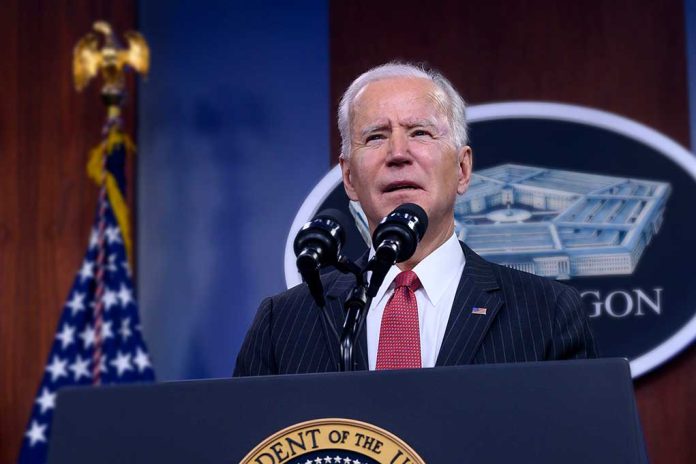
President Biden’s historic clemency decision sparks debate over presidential pardon power and its potential consequences.
At a Glance
- Biden commuted sentences of 1,500 individuals and pardoned 39 others in the largest single-day clemency action in modern U.S. history
- Most beneficiaries were under home confinement during the COVID-19 pandemic
- The administration is considering preemptive pardons, raising concerns about potential abuse of presidential power
- Biden’s pardon of his son Hunter has fueled controversy and public debate
- Experts warn of potential consequences and precedents set by these clemency actions
Biden’s Unprecedented Clemency Action
President Joe Biden has taken a bold step in criminal justice reform by commuting the sentences of approximately 1,500 individuals who were released to home confinement during the COVID-19 pandemic. This action marks the largest single-day clemency in modern U.S. history, far surpassing the previous record of 330 acts set by former President Barack Obama. Additionally, Biden pardoned 39 people convicted of nonviolent crimes, emphasizing his commitment to providing second chances and addressing issues within the criminal justice system.
The commutations apply to those who have served at least one year under home confinement after being released to reduce the spread of COVID-19 in prisons, where one in five prisoners tested positive at the peak of the pandemic.
“America was built on the promise of possibility and second chances. As president, I have the great privilege of extending mercy to people who have demonstrated remorse and rehabilitation, restoring opportunity for Americans to participate in daily life and contribute to their communities,” President Biden said in a statement.
Controversial Pardon and Public Reaction
While many applaud Biden’s clemency actions, his decision to pardon his son, Hunter Biden, for gun and tax crimes has ignited a firestorm of controversy. The president argues that the prosecution was politically motivated, but critics view it as preferential treatment. A recent poll indicates that only about 20% of Americans support the decision to pardon Hunter Biden, highlighting the divide in public opinion on this matter.
And there it is. President Biden pardoned his son Hunter Biden
“Today, I signed a pardon for my son Hunter. From the day I took office, I said I would not interfere with the Justice Department’s decision-making, and I kept my word even as I have watched my son being… pic.twitter.com/YzRLutcPmy
— Kadia Goba (@kadiagoba) December 2, 2024
The controversy surrounding Hunter Biden’s pardon has overshadowed the broader clemency actions, which include pardons for individuals convicted of nonviolent offenses such as drug crimes. Among those pardoned are a woman who led emergency response teams, a church deacon turned counselor, and a decorated military veteran. These cases exemplify Biden’s stated goal of promoting rehabilitation and reintegration into society.
Preemptive Pardons and Legal Concerns
Perhaps the most contentious aspect of Biden’s clemency considerations is the potential use of preemptive pardons. The administration is reportedly exploring the idea of issuing pardons to individuals who might become targets of the U.S. Department of Justice during the second Trump administration. This unprecedented move has raised significant concerns among legal experts and politicians alike.
“To protect one’s political allies prospectively just creates a really bad precedent,” says Frank Bowman, a professor at the University of Missouri School of Law.
Critics argue that preemptive pardons could undermine the justice system and set a dangerous precedent for future presidents. The use of such pardons to shield political allies from potential legal consequences raises questions about the limits of presidential power and the integrity of the justice system. Some experts suggest that a more appropriate use of the pardon power would be to address clear injustices and promote national unity, rather than creating what could be perceived as “impunity zones” for political allies.
Future Implications and Ongoing Debate
As Biden’s term comes to an end, the debate over his use of clemency powers is likely to intensify. Advocacy groups continue to push for broader use of pardons, including commuting sentences for those on federal death row. The president has pledged to continue reviewing clemency petitions, suggesting that more pardons and commutations may occur before his term ends on January 20.
The unprecedented scale of Biden’s clemency actions and the controversial considerations of preemptive pardons have set the stage for a complex legal and ethical debate about the future use of presidential pardon powers. As the nation grapples with these issues, the impact of these decisions on the criminal justice system and the balance of power in government will undoubtedly be scrutinized for years to come.






















